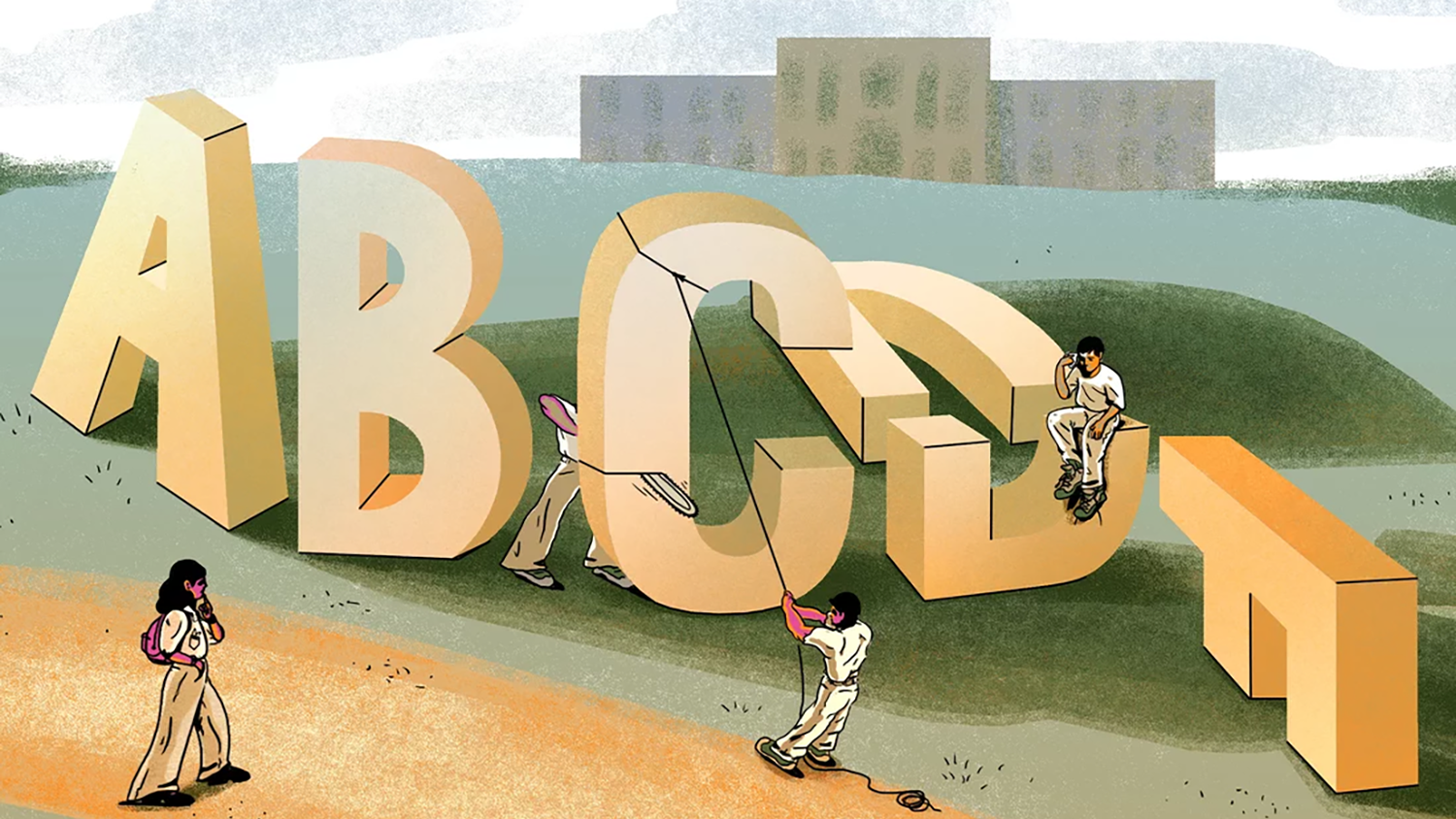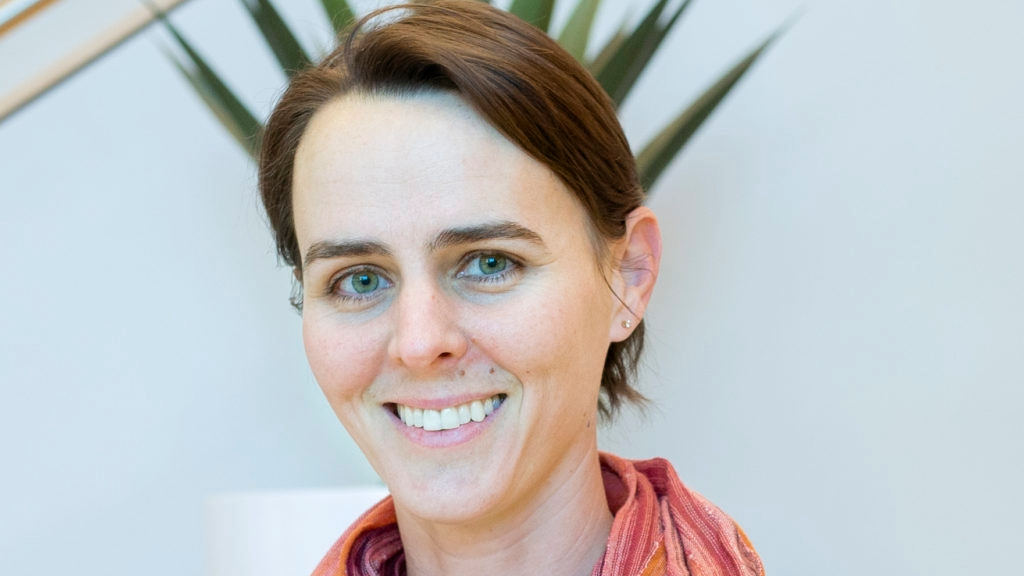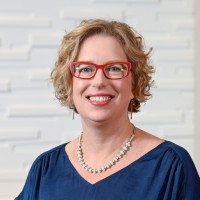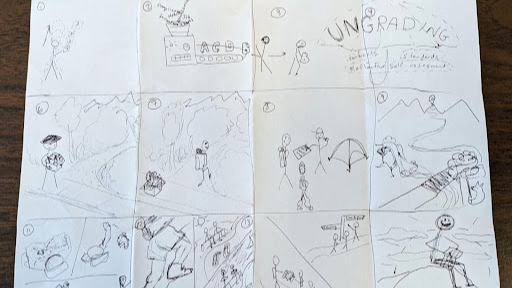Ungrading: Empowering Student Success through Feedback and Reflection

“Learning is always a journey — but if your only focus is racing to your destination, you’ll miss some pretty cool things along the way.”
So says Lisa Falk in a voiceover for the DELTA-produced animation What is Ungrading? The animation explains the movement to decenter the role of numeric grades in formal learning environments in favor of qualitative instructor feedback and student self-reflection — ungrading.
An associate teaching professor in the Department of Marine, Earth and Atmospheric Sciences (MEAS), Falk has long been an advocate for the advantages of ungrading as an assessment style.
Targeted toward both students and anyone else who might want to learn more about the philosophy behind the ungrading movement, the animation and complementary toolkit came to fruition through a 2023-2024 DELTA Exploratory Grant. Falk was the Principal Investigator (PI) for the grant, titled “Empowering self-reflection and self-direction under the ungrading umbrella.”
Falk was already implementing ungrading strategies in some of her courses. With support from the grant, she wanted to integrate her existing technology solutions with Moodle-specific tools to increase the efficiency of her ungrading processes and foster greater student success.
Streamlined integration with Moodle would also provide Falk with opportunities to share her pedagogical practice with other NC State instructors interested in ungrading. To that end she lent her expertise to the development of a nascent ungrading learning community on campus that brings together faculty and staff in collaborative conversations around ungrading implementation.
To accomplish her goals, Falk turned to DELTA. Over the course of the yearlong grant, she partnered with the project team to focus on exploring educational technology that supports ungrading in Moodle. Other project goals included identifying best practices for providing student feedback and strategies for educating the campus community about the benefits, challenges and implementation of ungrading.
Students as Pedagogical Partners
The philosophy behind ungrading suggests that conventional numeric-based assessment practices deter students from learning to their full potential. When students are focused on the end goal of a grade, they frequently miss out on the opportunities for growth through deep engagement with their learning journey.
“Grades are sometimes framed as a way to incentivize learning, but traditional grades provide the wrong incentives: maximizing a grade rather than learning,” explained Falk. “In fact, studies suggest that grades more often reduce students’ motivation to learn.”

Instead, ungrading shifts the focus from the traditional, systemic practice of numeric grading to student self-monitoring and self-assessment, making the student a pedagogical partner in the educational journey. The practice emphasizes student autonomy, agency and transparency.
Moreover, instructors across the country are increasingly suggesting that ungrading is a more equitable assessment practice that fosters greater inclusion and belonging in classrooms. This appears particularly true for marginalized students who might not be as prepared for college as their peers.
An instructor employing ungrading in the classroom may use multiple strategies for assessment depending on the course modality, content and teaching style. Many use qualitative feedback — from the instructor, peers, student self-assessment and sometimes external experts or clients — as the primary catalyst for reflection and growth. Students may have opportunities to resubmit work that does not meet expectations, and offer their own course grade in consultation with the instructor.
But what does that process look like in courses using a learning management system (LMS) like Moodle?
Implementing Tools for Ungrading in Moodle
The grant focused on two of Falk’s courses: MEA 100, a high-enrollment first-year orientation course on Earth systems science offered year-round, and MEA 440, a specialized course for geology majors on igneous and metamorphic petrology offered only during spring semester.
Working with the different student populations demonstrated that there is no one-size-fits-all approach to ungrading and its implementation. Strategies that worked in a large freshman survey course were less helpful for seniors on the cusp of earning their degrees.
“This project confirmed that Moodle can be a very flexible tool but that not every feature will work to solve all challenges,” explained co-project lead Kerri Brown Parker. “It takes research, trial and error and lots of documenting investigations to find a good fit connecting tool and challenge.”

Exploring the nuanced differences in student perspectives helped Brown Parker and co-project lead Bethany Smith develop better resources for Falk’s course, as well as practical solutions for broad implementation of a shared toolkit for ungrading success across NC State. The toolkit includes the following Moodle plug-ins:
- Moodle Roadmap was developed by DELTA to empower instructors in creating an interactive, visual representation of course structure and process. Roadmap helps students monitor their course progress and reflect on their learning through a three-level organization structure that builds upon prior learning throughout the course.
- Moodle Checklist allows instructors to create a checklist for their students with linked course activities and additional “to-do” list items added by the instructor or students. Once the completion requirements are met for an activity, it automatically marks them done on the checklist.
- Moodle Outcomes are specific descriptions of what a student should understand upon completion of an activity or course, based on the course learning objectives. Students can use the gradebook to see their progress via a scale used for each outcome, and instructors can view the outcomes report to see how the class is collectively progressing.
- Moodle Scales evaluate students’ performance using descriptors, such as proficient, needs work, satisfactory and try again, rather than numeric grades or points. Instructors can build custom rating scales, which can be used to provide feedback on specific Moodle activities.
See these tools in action in this Moodle Ungrading Demo Course. Use anonymous access to view the course or enroll as an instructor to view various settings, grading structures and tools.
The project team is eager to share these resources with instructors across campus. “We hope to help interested, innovative faculty who are trying new methods find solutions to challenges with Moodle and our other instructional tools,” Brown Parker said.
Findings, Challenges and Misconceptions
During the grant period, Falk and the project team partnered on developing extensive student surveys to assess students’ understanding of ungrading, as well as their perceptions of its effectiveness. The team specifically looked at motivation to complete coursework and amount learned in the course.
“Working with the DELTA team was incredible,” Falk said. “They helped take a systematic approach to reviewing available tools and their benefits and limitations, but also brought a lot of creativity to the project.”
Their findings indicate that, by and large, students in both courses:
- Learned more in the course than in other NC State courses, and perceived the ungrading environment to be a key factor in the amount learned.
- Felt similar or greater levels of motivation to work on course content compared to other courses at NC State, and perceived ungrading as a key factor in that motivation level.
- Found the new Moodle tools implemented in support of ungrading (Roadmap and Outcomes) from somewhat to very helpful in their course success.
“The ungrading approach was very helpful for my performance in this class and my mental health outside of class,” a student in MEA 440 shared. “In this class, I felt less stress about grades and felt driven to do my work to prove that I was learning and could demonstrate my knowledge on the topic.”

One of the challenges inherent in implementing ungrading in a classroom is clarifying the philosophy and practice to instructors and students who are new to the process. Both Falk and the project team have been proactive in sharing their experiences and resources at NC State and beyond at presentations, workshops and conferences.
A common misconception around ungrading is that it will lead to increased use of AI and cheating. A recent meta-analysis found that, overwhelmingly, students are less likely to cheat when they are given a clear goal structure and are empowered to take ownership of their learning.
“Ungrading is an amazing tool for professors to use,” said a student in MEA 100. “It has not affected my performance in the course nor made me willing to cheat. The learning is flexible which is wonderful to have.”
Of more concern is the tendency of some students, particularly women and those from less privileged backgrounds, to underrate their course performance and grade in self-assessments relative to what the course instructor would give. Falk approaches the issue by providing clear structure for self-assessment and meeting one-on-one with her upper-level students to offer prompt feedback to those assessments.
Falk also works to build a culture of trust in her classroom that relies on students’ intrinsic motivation to learn. “Ungrading empowers students to take ownership of their learning, to evaluate their progress with honesty and integrity, and to recognize the value of every step taken along the way,” she concludes in the DELTA-produced animation.
Special thanks to the DELTA project team, whose ungrading toolkit offers a comprehensive menu of learning resources, DELTA-supported education technology and tips for success:
- Kerri Brown Parker, Assistant Director of Instructional Technology Training, Co-project Lead
- Bethany Smith, Director of Instructional Support and Training, Co-project Lead
- Andrew Wiedner, Multimedia Specialist, Digital Learning
Want to learn more about implementing ungrading into your courses?
- Explore resources on the DELTA Ungrading Toolkit
- Learn more about DELTA Exploratory Grants and sign up to receive grant communications
- Sign up for upcoming workshops on Moodle plug-ins like Roadmap and Outcomes
- Join the NC State Ungrading Implementation Learning Community.


